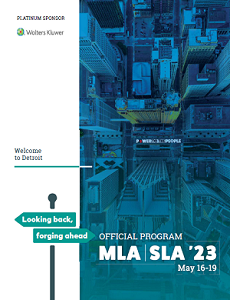Lightning Talk: Program Description Abstract
Information Services
In Person
On Demand
Session: Lightning Talk Session 3
Authorship or Acknowledgement? A Complicated Question!
Friday, May 19, 2023
9:45 AM - 9:50 AM EDT
Location: 251B
- JD
Jennifer Deberg, OT, MLS
User Services Librarian
University of Iowa
Iowa CIty, Iowa
Author and Main Contact(s)
Background: For librarians supporting systematic reviews, determining whether to request authorship, acknowledgement, or neither can be a conundrum. This talk will present an overview of the factors surrounding these decisions including a few case examples from my experience supporting reviews. The aim is to stimulate ongoing critical thought, discussion, and ideas to provide improved guidance.
With the rise in publication of systematic reviews, awareness of the need for librarian expertise has grown, supported by reputable organizations such as the Cochrane Collaboration. Recently, the Medical Library Association released an authorship statement to provide additional support for co-authorship in publication. There is potential for this statement, important as it is, to be misinterpreted as a standard of practice or a mandate.
Description: Decision challenges are most likely to arise when considering accountability for research integrity. For example, when the practices of the research team do not seem conducive to accuracy/integrity, authorship does not seem to be the best choice. In these types of situations, is it better to be acknowledged for sloppy work than not recognized at all? Also, due to the volume of requests coupled with communication challenges, it can be difficult to keep up with progress of supported reviews. This may result in the librarian not seeing the final manuscript prior to submission, which is an obvious problem
Conclusion: It would be unwise to interpret the recent authorship statement mentioned as a directive to always seek authorship for supported reviews. Although the evidence correlating librarian co-authorship with more complete and transparent methodology should be communicated to systematic review teams, it should viewed as support for sustained librarian involvement on review teams. A case by case approach using sound professional judgment should guide decisions regarding attribution.
With the rise in publication of systematic reviews, awareness of the need for librarian expertise has grown, supported by reputable organizations such as the Cochrane Collaboration. Recently, the Medical Library Association released an authorship statement to provide additional support for co-authorship in publication. There is potential for this statement, important as it is, to be misinterpreted as a standard of practice or a mandate.
Description: Decision challenges are most likely to arise when considering accountability for research integrity. For example, when the practices of the research team do not seem conducive to accuracy/integrity, authorship does not seem to be the best choice. In these types of situations, is it better to be acknowledged for sloppy work than not recognized at all? Also, due to the volume of requests coupled with communication challenges, it can be difficult to keep up with progress of supported reviews. This may result in the librarian not seeing the final manuscript prior to submission, which is an obvious problem
Conclusion: It would be unwise to interpret the recent authorship statement mentioned as a directive to always seek authorship for supported reviews. Although the evidence correlating librarian co-authorship with more complete and transparent methodology should be communicated to systematic review teams, it should viewed as support for sustained librarian involvement on review teams. A case by case approach using sound professional judgment should guide decisions regarding attribution.

.png)
